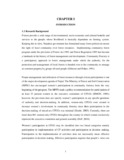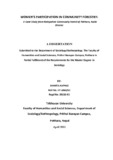Please use this identifier to cite or link to this item:
https://elibrary.tucl.edu.np/handle/123456789/542| Title: | Women’s Participation in Community Forestry: A Case Study from Ratopahiro Community Forest of Pokhara, Kaski District |
| Authors: | Kaphle, Shanta |
| Keywords: | Participation;community forest;decision making;benefit sharing |
| Issue Date: | 2011 |
| Publisher: | Department of Sociology/Anthropology, Prithvi Narayan Campus, Pokhara |
| Institute Name: | Prithivi Narayan Campus, Pokhara |
| Level: | Masters |
| Abstract: | The study entitled “Women’s Participation in Community Forest Management: a case study from Ratopahiro community forest user groups of Pokhara, Kaski district was carried out aiming at examining women’s involvement in community forestry management, especially, in implementing programs, making decision, sharing and managing community forest resources. A set of questionnaires was prepared, tested and used for interviewing along with some popular RRA tools like focused group discussion, key informant interview, participant/direct observation. Women users from each household (all together 35 households) selected randomly and treated as a unit of analysis. The analysis is done by using simple statistical tools such as percent, average, graphs and figures and described in a logical way. The key finding of the study is that there is no proper and proportional participation of women in the processes and outcomes of the community forest. Despite certain percentage of quota for women is mandatory, there is less participation of women in decision making and benefit sharing. Women from diverse ethnic and academic background have some common problem that their voice and choice are given less priority by elite or men. The study has prioritized the need and interest of women is the prime motivational factor which is accelerated by leaders of CF, family members and development worker. However, the participation of women is affected by individual skill and knowledge, work load, economic condition, socio-cultural values and norms. The study suggests that active and interactive participation of women secures women’s rights to control and access over the forest resources and provides many opportunities to lead in the community forest. For this, women are to be empowered and motivated by providing formal and informal education through training and visit. Inclusive policy as mentioned in CFDP has to be implemented strictly from FUG and DFO. Devising benefit sharing mechanism based on the principles of equity, productivity and sustainability and providing conducive environment from the state help in promoting high degree of women’s participation. Key words: Participation, decision making, benefit sharing, community forest |
| URI: | http://elibrary.tucl.edu.np/handle/123456789/542 |
| Appears in Collections: | Sociology |
Files in This Item:
| File | Description | Size | Format | |
|---|---|---|---|---|
| Chapter Pagedocx.pdf | 568.03 kB | Adobe PDF |  View/Open | |
| Cover Page(6).pdf | 117.22 kB | Adobe PDF |  View/Open |
Items in DSpace are protected by copyright, with all rights reserved, unless otherwise indicated.
